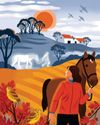Denemek ALTIN - Özgür
Fragile Beauty
BBC Countryfile Magazine
|February 2017
The delicate avocet is a now common sight on Britain’s coasts but it took an accident of wartime and a top secret mission to rescue this graceful bird from extinction.

I can recall the moment I first saw an avocet. It was in 1976 at Minsmere in Suffolk, the flagship reserve of the Royal Society for the Protection of Birds. I was a schoolboy of 16 and it was that glorious hot summer when the sun seemed to shine every day without end. With two friends I walked to the coastal hide overlooking the reserve’s famous wetland scrape.
In the sweltering temperatures, the surface water and the first few inches of air above the sand-flats quivered in heat haze. About 50 avocets were scattered across the scrape and they were busy feeding or tending the curious pin-legged fur balls that are their chicks. It was the adults, however, that captivated me.
Their long lavender legs were rendered more insubstantial by the quaking air so it looked sometimes as if they were floating. The white of their bodies merged with the sun-flare bouncing off the shallows, and at times the creatures seemed more mirage than bird.
I studied in detail the intricate black patterns on the porcelain-white plumage and the black helmet clamped over the slender curve of the birds’ white necks. Then there was the ridiculous beak, needle fine, twisted upwards and swept back and forth relentlessly as the avocets fed. Everything about them seemed intensely fragile as if a good breeze might cause the whole flock to dematerialise like mist.
Today, I see avocets very differently. For one thing, they are widespread and much more common. They breed within half a mile of my house in the Norfolk Broads and just downstream from us a post-breeding flock at Breydon Estuary can reach 1,300 birds.
Bu hikaye BBC Countryfile Magazine dergisinin February 2017 baskısından alınmıştır.
Binlerce özenle seçilmiş premium hikayeye ve 9.000'den fazla dergi ve gazeteye erişmek için Magzter GOLD'a abone olun.
Zaten abone misiniz? Oturum aç
BBC Countryfile Magazine'den DAHA FAZLA HİKAYE

BBC Countryfile Magazine
Manors and meadows
This December marks 250 years since Jane Austen's birth. To celebrate, Jack Watkins ambles around Chawton, where the writer penned novels that changed fiction forever
7 mins
December 2025

BBC Countryfile Magazine
TOP 10 ROYAL RESIDENCES
Castles, palaces and stately homes open a window into the history and private lives of the British monarchy
9 mins
December 2025

BBC Countryfile Magazine
Your countryside
HAVE YOUR SAY ON RURAL ISSUES
1 mins
December 2025

BBC Countryfile Magazine
Community spirit
Rural pubs across Britain are closing at an alarming rate - but local people are fighting back to save inns that have been at the hearts of their villages for centuries. Vivienne Crow orders a pint
4 mins
December 2025

BBC Countryfile Magazine
Gift ideas for nature lovers
Find inspirational and thoughtful presents for all the family in our pick of top outdoor gear and a round-up of this year's best nature and wildlife books
2 mins
December 2025

BBC Countryfile Magazine
Toad numbers are in freefall.It's in our power to save them
After becoming engaged at Christmas in 1998, my new fiancé and I were confronted by an enormous toad on the way to meet the vicar.
2 mins
December 2025

BBC Countryfile Magazine
Conquer fell running
Infamously tough yet famously friendly, the sport of fell running will take your fitness to new heights amid the wildest landscapes. Here's our beginners' guide
3 mins
December 2025

BBC Countryfile Magazine
A glorious haunting
They lived in the same village and shared the same dreams – just 60 years apart.
6 mins
December 2025

BBC Countryfile Magazine
The big questions answered
Across the UK, but particularly in the southeast of England, giant and featureless buildings are springing up.
13 mins
December 2025

BBC Countryfile Magazine
Away in a manger
While most of us down tools and pick up the mince pies, a farmer's work doesn't stop for the festive break.
5 mins
December 2025
Translate
Change font size
